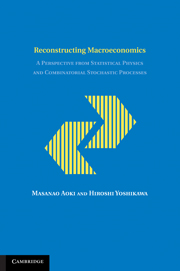 Reconstructing Macroeconomics
Reconstructing Macroeconomics Book contents
- Frontmatter
- Contents
- Preface by Masanao Aoki
- Preface by Hiroshi Yoshikawa
- 1 Introduction: A New Approach to Macroeconomics
- 2 The Methods: Jump Markov Process and Random Partitions
- 3 Equilibrium as Distribution: The Role of Demand in Macroeconomics
- 4 Uncertainty Trap: Policy Ineffectiveness and Long Stagnation of the Macroeconomy
- 5 Slow Dynamics of Macro System: No Mystery of Inflexible Prices
- 6 Business Cycles: An Endogenous Stochastic Approach
- 7 Labor Market: A New Look at the Natural Unemployment and Okun's Law
- 8 Demand Saturation-Creation and Economic Growth
- 9 The Types of Investors and Volatility in Financial Markets: Analyzing Clusters of Heterogeneous Agents
- 10 Stock Prices and the Real Economy: Power-Law versus Exponential Distributions
- References
- Author Index
- Subject Index
- Other books in the series (continued from page iii)
4 - Uncertainty Trap: Policy Ineffectiveness and Long Stagnation of the Macroeconomy
Published online by Cambridge University Press: 08 August 2009
- Frontmatter
- Contents
- Preface by Masanao Aoki
- Preface by Hiroshi Yoshikawa
- 1 Introduction: A New Approach to Macroeconomics
- 2 The Methods: Jump Markov Process and Random Partitions
- 3 Equilibrium as Distribution: The Role of Demand in Macroeconomics
- 4 Uncertainty Trap: Policy Ineffectiveness and Long Stagnation of the Macroeconomy
- 5 Slow Dynamics of Macro System: No Mystery of Inflexible Prices
- 6 Business Cycles: An Endogenous Stochastic Approach
- 7 Labor Market: A New Look at the Natural Unemployment and Okun's Law
- 8 Demand Saturation-Creation and Economic Growth
- 9 The Types of Investors and Volatility in Financial Markets: Analyzing Clusters of Heterogeneous Agents
- 10 Stock Prices and the Real Economy: Power-Law versus Exponential Distributions
- References
- Author Index
- Subject Index
- Other books in the series (continued from page iii)
Summary
History shows us that the economy can be trapped in long stagnation. In the nineteenth century, the British economy suffered from the Great Depression for almost a quarter of century (1873–96). The Great Depression in the 1930s attacked the whole world. And since the beginning of the 1990s, the Japanese economy has stagnated for more than a decade.
In every episode, various policies were discussed and tried. Yet the economy did not revive, falling into long stagnation. Certainly, in each case, there must have been policy mistakes. Granted, it appears that once the economy is trapped into a deep depression, the effectiveness of standard policy measures weakens. Irving Fisher (1933), for example, in relation to his famous debt-deflation theory made the following argument.
There may be equilibrium which, though stable, is so delicately poised that, after departure from it beyond certain limits, instability ensues, just as, at first, a stick may bend under strain, ready all the time to bend back, until a certain point is reached, when it breaks. This simile probably applies when a debtor gets “broke,” or when the breaking of many debtors constitutes a “crash,” after which there is no coming back to the original equilibrium. To take another simile, such a disaster is somewhat like the “capsizing” of a ship which, under ordinary conditions, is always near stable equilibrium but which, after being tipped beyond a certain angle, a tendency to depart further from it. (p. 339)
In this chapter, we focus on uncertainty.
Information
- Type
- Chapter
- Information
- Reconstructing MacroeconomicsA Perspective from Statistical Physics and Combinatorial Stochastic Processes, pp. 89 - 120Publisher: Cambridge University PressPrint publication year: 2006